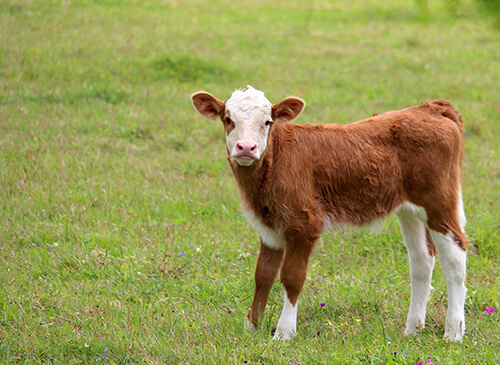Creep Feeding Beef Calves
Jun 15, 2020

Hot, dry weather during the summer and early fall months can reduce forage quality and decrease calf gains. Creep feeding can be a profitable addition in the summer by providing cost-effective calf gains, extending your forage, reducing cow stress and weight loss, and improving low reproduction.
When choosing the right feed to use in the summer, consider what nutrients your calves need in order to maximize their genetic potential and what nutrients are available to them. Calves need 14- to 16-percent protein along with adequate energy, minerals, and vitamins to maximize their structural growth. You need to choose a feed that will meet those needs. Forages at this time of year are usually low in protein, energy, vitamins, and minerals. While corn is an excellent energy source, it will not provide adequate amounts of protein, minerals, and vitamins — only fat.
Co-op has several feeds that can meet the protein, energy, and nutrient needs of your calves, including Co-op Calf Primer I with Rumensin, Co-op 14% Select Hi-E with Rumensin, and Co-op Cattle Prep pellets with Rumensin.
Plus, your local Co-op offers several types of creep feeders, both portable and stationary styles. Talk to your Co-op livestock specialist for more information on the returns you can gain from creep feeding your calves.
When choosing the right feed to use in the summer, consider what nutrients your calves need in order to maximize their genetic potential and what nutrients are available to them. Calves need 14- to 16-percent protein along with adequate energy, minerals, and vitamins to maximize their structural growth. You need to choose a feed that will meet those needs. Forages at this time of year are usually low in protein, energy, vitamins, and minerals. While corn is an excellent energy source, it will not provide adequate amounts of protein, minerals, and vitamins — only fat.
Co-op has several feeds that can meet the protein, energy, and nutrient needs of your calves, including Co-op Calf Primer I with Rumensin, Co-op 14% Select Hi-E with Rumensin, and Co-op Cattle Prep pellets with Rumensin.
Plus, your local Co-op offers several types of creep feeders, both portable and stationary styles. Talk to your Co-op livestock specialist for more information on the returns you can gain from creep feeding your calves.